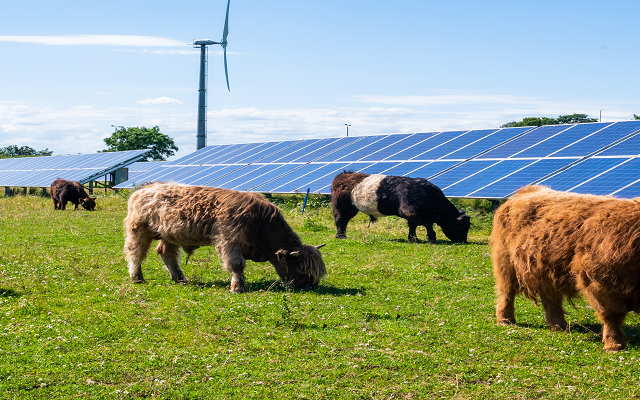Land Business Update | Week Commencing 5th December
Welcome to our update on key land management, farming, planning and energy issues.
This is the last Land Business Update for 2022 and it’s a bumper one although there is not a lot of Christmas spirit? Bah humbug. We hope you have a merry Christmas and a healthy, happy and successful 2023.
FARMING AND THE ENVIRONMENT
Onshore wind turbines to be allowed in England if supported locally
In a change in policy, from both the Cameron government and PM Sunak’s position during the summer election campaign, the government will consult on allowing turbines to be built if they have local support and local concerns have been ‘satisfactorily addressed’. It will also consult on making it easier to upgrade existing sites, which probably means erecting taller turbines.
Another change in policy, as part of the Levelling Up and Regeneration Bill, is that the government has dropped mandatory housebuilding targets for local councils. To do this, individual councils will have to demonstrate that the central target would significantly change the character of their area. Councils may also be given powers to fine developers for not building on land that has planning permission for houses.
Changes confirmed to Environmental Land Management schemes in England
As widely leaked, Defra has confirmed that it is planning to significantly change its plans for the new ELM schemes. The changes are as previously reported:
- The Countryside Stewardship scheme (CSS) will be retained, ‘enhanced’ and will replace the Local Nature Recovery Scheme. The reaction has been mixed: some organisations have said that improving an existing scheme that is generally liked by land managers and that the RPA can administer is sensible; others, mainly environmental bodies, say that it needs to be significantly improved, as the scale and quality of the environmental improvements delivered by agreements has not reversed the decline in nature.
- The changes to the CSS will have knock on effects on the Sustainable Farming Incentive (SFI) and it is expected that some of options will be moved into CSS. It is widely expected that payment rates could increase to boost take up.
- Landscape Recovery, which funds significant land use changes, is expected to continue. It has been over-subscribed to date.
The next formal announcement on the schemes is expected early in the New Year. In the meantime, the next application window to join Countryside Stewardship will open in February for agreements starting in 2024. To date, Defra has been flexible with existing agreement holders so that they are not disadvantaged compared with new schemes. Our advice remains to consider the existing schemes and not to wait for the new schemes, most of which have been delayed.
Slurry Investment Grant open for applications
This English grant, which opened on 6th December, will pay 50% of the cost of upgrading slurry storage capacity to six months and other slurry infrastructure. Grants of £25,000 to £250,000 are available per applicant. The magnificently named Slurry Wizard tool can be used to work out what slurry capacity is required. There is a two stage application process. The online checker is open until 31st January 2022, after which the RPA will be inviting successful applicants to submit a full application. If you would like more information, you can read our blog post or contact Alice Johnson.
New Entrant Scheme Pilot now open in England
This scheme supports individuals with some farming
experience to develop their businesses, as well as offering support to pitch
for land and the finance required. This pilot scheme is targeted at people who
do not have their own land-based business and at individuals with four to 10
years’ experience running a land-based farming business. 200 participants in
total are expected to be enrolled and the pilot is only open in some locations
(West Midlands, South West, South East and North East). More information can be
found here.
Do contact us if you are interested and would like help applying to take part.
Government work to avoid tax disadvantages for work that benefits biodiversity and the climate
In response to a question in the House of Lords, the government has said that the Treasury, HMRC and Defra have been working closely to consider the potential need for changes to the tax system. When pressed for action rather than ‘kind words’, the government minister could not give more detail or any timescales for firm statements or policy, despite saying in October 2021 that it was reviewing this subject.
COP 27 and how green will the Sunak government be?
COP 27 was supposed to be the ‘Implementation COP’ but most commentators left feeling disappointed with the lack of agreed actions. The chance of hitting the global limit of 1.5C this decade is now estimated to be 50%, according to the Emissions Gap Report published by UNEP. This is a significant warning and we must all play our individual roles in cutting emissions. One of the clearest statements on this was made by Nigel Topping, the UK’s High-Level Climate Action Champion, in his closing speech. He said, “‘The Truth is that 1.5C is not a target. As Earth systems scientists remind us: 1.5C is a limit. A limit anchored in physics: beyond which we unleash tipping points to hell.”
The end of COP 27 is a good time to assess what the new government’s environmental ambitions might be:
- Speaking to MPs, PM Sunak said that he wants to deliver on net-zero pledges and lead an ‘environmentally focused government’. It is not clear what this really means.
- The government’s support for environmental improvement, including the Environmental Land Management schemes, is becoming a little clearer although there are concerns about whether revised Countryside Stewardship will deliver better outcomes (see above).
- Another key test is how quickly it publishes the UK environmental targets, which were due at the end of October, and how strong they are. Many organisations are concerned about the government – and the previous one but one, so the Johnson one – being disingenuous with environmental figures. For example, saying that it is close to meeting its pledge to protect 30% of land and sea by 2030, as it counts National Parks and Marine Protection Areas, is misleading. The actual area being properly protected and managed for nature is closer to 3%, according to Wildlife and Countryside Link.
- During the first election contest this summer, Sunak said he wanted the UK to be energy independent by 2045, with pledges for more offshore wind and rooftop solar. These are both positive and the government is planning to make policy more positive towards onshore wind (see above).
- However, it is unclear what the PM’s thoughts are now on solar farms on farmland. He was previously against them but we think that position has been reversed. The case for solar in terms of delivering additional electricity generation quickly and in terms of land use efficiency is very strong.
- Counter to this, the government has approved the first new coal mine in 30 years. It will extract coking coal used in steel and chemical works. The Climate Change Committee called the scheme ‘absolutely indefensible’.
- It is also unknown whether the government will continue with the Retained EU Law Bill in its current form. Many environmental groups see it as a ‘threat to the future of nature and climate’, due to its deregulatory effect. The number of pieces of legislation that could be replaced is now thought to be over 1,000, much greater than previous estimates.
- Both the climate minister (Graham Stuart) and chair of COP26 (Alok Sharma) have been demoted from the Cabinet.
ENERGY
Almost 80% of farms do not generate any renewable energy
If they did, they could generate over £1bn in benefits for the farms, from reduced energy bills and income from selling energy to the grid, according to data from the Energy and Climate Intelligence Unit. S&P comment: we think that this data supports the case for solar development on farmland. Land used for solar PV generates much more energy per hectare than any biofuel (biodiesel and bioethanol) and so is a more efficient use of space. The UK could meet its targets for energy generation from solar by using a fraction of the land currently used for biofuel production. The land can also grow food and support wildlife but managing the scale of solar farms is important so that they do not adversely affect the character of places.
Village halls at risk of closing due to rise in energy bills
10% of village halls are currently spending over a third of
their budgets on energy bills, according to Action with Communities in Rural
England (ACRE). This is creating concern in rural communities, where village
halls are often the primary, if not only, meeting place. To prevent these halls
from having to close down, ACRE is calling for a reduction in taxes payable on
energy bills and funding to be made available for retrofitting and transforming
them into ‘warm hubs’.
FORESTRY
New funding for tree planting in honour of Her Majesty Queen Elizabeth
The Queen’s Green Canopy, a new funding initiative to support tree planting across England, has been announced. The £500,000 fund will be delivered by a range of partners, including Trees for Cities, The Tree Council, The Conservation Volunteers and Earthwatch, to benefit local communities whilst contributing to the nation’s tree planting goals. More information can be found here.
Trees outside woods produce £3.8 billion of benefits across the UK
Valuing woodlands is a familiar exercise (please contact Alex Brearley) but recent data from Forest Research and Defra has put a figure on the economic value of individual trees planted outside of woodlands. The value comes to £3.8bn and the valuation took into account various criteria including the carbon sequestration capacity of trees, whether they help mitigate flooding and their positive impact on society by improving health and wellbeing. Forestry Minister Trudy Harrison says it highlights that the value of trees is not only in woodlands and forests and that these findings should encourage councils in urban areas to plant more trees.
PROPERTY
Annual Tax on Enveloped Dwellings (ATED)
Businesses holding residential property worth more than £500,000 in a company and liable for ATED will need a revised valuation for their April 2023 tax return. This annual tax is based on a valuation of the property, which must be revalued every five years. More properties are likely to be subject to ATED due to the increase in house prices since the last revaluation in 2017. Please contact Tom Lockton in our valuation team if you would like to discuss this.
£1bn ECO+ scheme launched
Grants to fund low-cost energy efficiency measures such as loft and cavity wall insulation will be available from spring 2023 to homes that have low energy efficiency ratings (D or worse) and are in lower council tax bands (probably A to D only). The grants will be available through energy suppliers or district councils to home owners and renters (both private and social). NB Not all energy suppliers will participate. If a household is eligible for support, its energy supplier will do a survey and manage the grant for the improvements. The aim of the scheme is to improve the energy efficiency of UK housing, which is one of the worst in Europe, and to reduce energy demand by 15% by 2030, which is a government target. We expect more details on eligibility in due course.
Even if a house does not qualify for this grant, it is still worth paying for some energy efficiency improvements. For example, the Energy Saving Trust estimates that for a typical three-bedroom house installing cavity wall and loft insulation and draught proofing measures could save £555 on an average annual energy bill (based on October 2022 energy prices).
Home buyers prepared to pay a premium for low-carbon properties
Good insulation and lower energy bills are now within the top three criteria for buying a home, along with location. Research by Legal & General Capital and YouGov has found that buyers are prepared to pay a premium of up to 20% to have a more energy efficient home. This is encouraging and makes the case that investing in retrofitting and low carbon homes does increase their value. The research also highlighted that only one in three people understands Energy Performance Certificates, which suggests that work remains to be done to inform people around what energy efficiency means.






